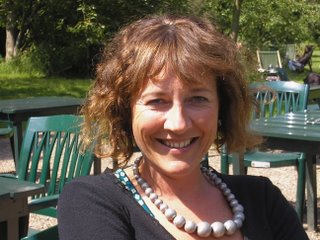Jill Dawson's THE GREAT LOVER, and her Rupert Brooke
I kept to my daily pattern on this first day back in Plymouth, turning right for the promenade on Plymouth Hoe rather than left for the university, so that I can reset myself by gazing at the sea. 'Twas a foolish romance this morning, wind spitting sharp rain into my face. So close to the sea, I keep stepping out into squalls.
I'm fresh back from the French Pyrenees, and its romantic sense of a winter getaway, our mountain village deep in snow with its power cut off as we arrived in the dark.
So it's sweet to cast my mind back to June 2007 when I was blogging about a visit to Grantchester (June 7th), outdoors yet warm in sunshine, taking tea in the Orchard Gardens with the writer Jill Dawson. This tea-room near Cambridge was once home to Rupert Brooke, before he moved to the Vicarage next door.
 As Jill and I chatted, the idea for her new novel settled into her head ... and rooted. It's out shortly (our discussion pleasingly acknowledged), and I read an advanced copy while bundled up against the chill of our French home. Called The Great Lover, after a poem by Brooke, the novel's a curious delight. The delight is in the writing, the characters, their tale, the fresh evocation of a landscape and time one hundred years ago. The 'curious' is in its fascinating blend of fact and fiction. Brooke shares top billing with a fictional maid, Nell Golightly. By the end of the book, following the factual course of his biography, he ships out to Pacific Islands to find a way of falling in love without a rush of complications. His heart, and better sense, keep yearning for this fictional Nell, a woman of earthy beauty and practical good sense.
As Jill and I chatted, the idea for her new novel settled into her head ... and rooted. It's out shortly (our discussion pleasingly acknowledged), and I read an advanced copy while bundled up against the chill of our French home. Called The Great Lover, after a poem by Brooke, the novel's a curious delight. The delight is in the writing, the characters, their tale, the fresh evocation of a landscape and time one hundred years ago. The 'curious' is in its fascinating blend of fact and fiction. Brooke shares top billing with a fictional maid, Nell Golightly. By the end of the book, following the factual course of his biography, he ships out to Pacific Islands to find a way of falling in love without a rush of complications. His heart, and better sense, keep yearning for this fictional Nell, a woman of earthy beauty and practical good sense.
A trip across domestic class structures is of course a bigger journey than a voyage around the world, so Rupert and Nell were never likely to become a real-life couple. Brooke is young and self-centred, much loved but not wholly lovable, but grows into the fullness of a real being by the novel's close. Nell grows too, but from the beginning I missed her whenever she departed the scene for a while. I fancied, somewhat foolishly no doubt, that Nell was Jill Dawson whisking herself back in time for a dalliance with the poet before letting him go. It's hard to make a character that real without investing her with a great deal of oneself.
I closed the novel with a real sense of Rupert Brooke, a caring for his life and time, that I suspect is at least as true and vivid as any I might have grasped from a biography. The book concludes with some details of where snatches of dialogue etc have been borrowed. Early on I thought Jill was playing a splendidly clever game, differentiating between Brooke the letter writer and the same man in memoir mode, the letters so much more self-conscious and stilted. In fact in turns out these letters were Brooke's own. In giving us Brooke in her own voicing, Jill's managed to improve him, setting him so beautifully in his period but delivering him to ours.
I'm fresh back from the French Pyrenees, and its romantic sense of a winter getaway, our mountain village deep in snow with its power cut off as we arrived in the dark.
So it's sweet to cast my mind back to June 2007 when I was blogging about a visit to Grantchester (June 7th), outdoors yet warm in sunshine, taking tea in the Orchard Gardens with the writer Jill Dawson. This tea-room near Cambridge was once home to Rupert Brooke, before he moved to the Vicarage next door.
A trip across domestic class structures is of course a bigger journey than a voyage around the world, so Rupert and Nell were never likely to become a real-life couple. Brooke is young and self-centred, much loved but not wholly lovable, but grows into the fullness of a real being by the novel's close. Nell grows too, but from the beginning I missed her whenever she departed the scene for a while. I fancied, somewhat foolishly no doubt, that Nell was Jill Dawson whisking herself back in time for a dalliance with the poet before letting him go. It's hard to make a character that real without investing her with a great deal of oneself.
I closed the novel with a real sense of Rupert Brooke, a caring for his life and time, that I suspect is at least as true and vivid as any I might have grasped from a biography. The book concludes with some details of where snatches of dialogue etc have been borrowed. Early on I thought Jill was playing a splendidly clever game, differentiating between Brooke the letter writer and the same man in memoir mode, the letters so much more self-conscious and stilted. In fact in turns out these letters were Brooke's own. In giving us Brooke in her own voicing, Jill's managed to improve him, setting him so beautifully in his period but delivering him to ours.


0 Comments:
Post a Comment
Links to this post:
Create a Link
<< Home